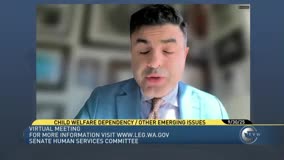Washington's Family Intervention Clinic Reduces CPS Involvement Through Innovative Support
September 30, 2025 | Legislative Sessions, Washington
This article was created by AI summarizing key points discussed. AI makes mistakes, so for full details and context, please refer to the video of the full meeting. Please report any errors so we can fix them. Report an error »

Washington State is taking significant strides in child welfare with the expansion of its Family Intervention Response to Stop Trauma clinic, which aims to support families before they become involved with Child Protective Services (CPS). Launched in 2019, the clinic is part of a growing movement that has seen the number of similar clinics in the U.S. increase from three to 38.
The clinic operates as a medical-legal partnership, collaborating with local hospitals and the Department of Children, Youth, and Families (DCYF) to provide resources to families in need. Instead of merely filing reports of concern, hospitals can now refer families directly to the clinic, allowing for proactive outreach and support. This approach has proven effective, with 83% of families served by the clinic managing to keep their children at home, even among those with prior CPS involvement.
The clinic's model emphasizes the importance of early intervention, aiming to prevent the trauma associated with family separation. By pairing parents with allies who have lived experience, the clinic provides emotional support and practical guidance on navigating the system. This innovative approach addresses the root causes of family distress, focusing on treatment and recovery rather than punitive measures.
During the recent Senate Human Services meeting, advocates highlighted the urgent need for more resources, including inpatient treatment options and family-centered programs. Currently, Washington State has fewer than 100 inpatient treatment beds available, which is insufficient to meet the demand. The Parent Child Assistance Program, which supports families with children aged 0 to 3, operates in only 20 of the state's 39 counties, leaving many without access to critical services.
The meeting underscored the necessity of breaking down silos within the child welfare system, fostering collaboration among medical professionals, social workers, and legal advocates. By creating a unified approach, stakeholders aim to improve outcomes for families and reduce the number of children entering foster care.
As the clinic continues to expand its reach and services, the focus remains on building a supportive community for families, ensuring they have access to the resources needed to thrive. The commitment to early intervention and holistic support represents a promising shift in Washington's approach to child welfare, with the potential to transform lives and strengthen families across the state.
The clinic operates as a medical-legal partnership, collaborating with local hospitals and the Department of Children, Youth, and Families (DCYF) to provide resources to families in need. Instead of merely filing reports of concern, hospitals can now refer families directly to the clinic, allowing for proactive outreach and support. This approach has proven effective, with 83% of families served by the clinic managing to keep their children at home, even among those with prior CPS involvement.
The clinic's model emphasizes the importance of early intervention, aiming to prevent the trauma associated with family separation. By pairing parents with allies who have lived experience, the clinic provides emotional support and practical guidance on navigating the system. This innovative approach addresses the root causes of family distress, focusing on treatment and recovery rather than punitive measures.
During the recent Senate Human Services meeting, advocates highlighted the urgent need for more resources, including inpatient treatment options and family-centered programs. Currently, Washington State has fewer than 100 inpatient treatment beds available, which is insufficient to meet the demand. The Parent Child Assistance Program, which supports families with children aged 0 to 3, operates in only 20 of the state's 39 counties, leaving many without access to critical services.
The meeting underscored the necessity of breaking down silos within the child welfare system, fostering collaboration among medical professionals, social workers, and legal advocates. By creating a unified approach, stakeholders aim to improve outcomes for families and reduce the number of children entering foster care.
As the clinic continues to expand its reach and services, the focus remains on building a supportive community for families, ensuring they have access to the resources needed to thrive. The commitment to early intervention and holistic support represents a promising shift in Washington's approach to child welfare, with the potential to transform lives and strengthen families across the state.
View full meeting
This article is based on a recent meeting—watch the full video and explore the complete transcript for deeper insights into the discussion.
View full meeting
